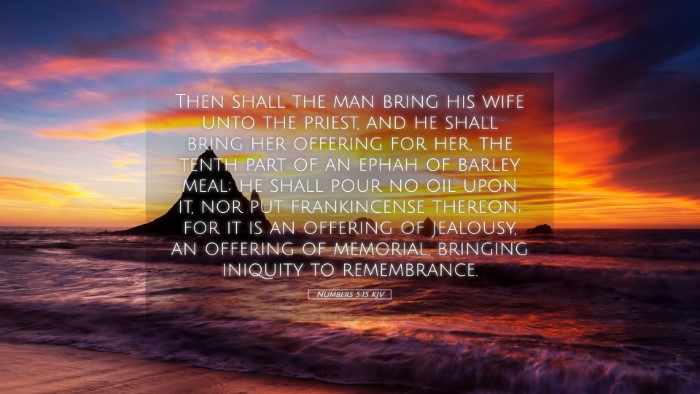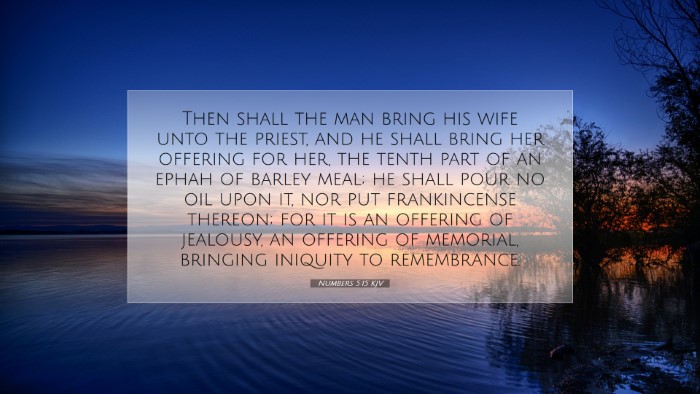Commentary on Numbers 5:15
Numbers 5:15 states: "Then shall the man bring his wife unto the priest, and he shall bring her offering for her, the tenth part of an ephah of barley meal; he shall not pour oil upon it, nor put frankincense thereon; for it is an offering of jealousy, an offering of memorial, bringing iniquity to remembrance." This passage addresses a unique legal provision concerning a suspected case of marital infidelity, commonly referred to as the "law of jealousy." The significance of this passage unfolds through various commentaries, highlighting its theological, historical, and practical implications.
Context and Summary
This verse is part of a larger section in the Book of Numbers that deals with laws regarding the purity of the camp of Israel, particularly focusing on interpersonal relationships within the community. The law of jealousy serves as a means of addressing suspicions that might arise in a marriage, indicating how seriously God regards faithfulness and integrity.
Insights from Different Commentaries
Matthew Henry's Commentary
Chief Themes: Matthew Henry highlights that this legislation reflects God's concern for the sanctity of marriage. He notes that the provision for a husband to bring his wife before the priest is significant in demonstrating the seriousness with which God holds marital fidelity. Henry points out the offering prescribed, consisting of barley meal without oil or frankincense, symbolizes humility and the gravity of the situation. In Henry's view, the absence of oil and frankincense, which are typically associated with joyous sacrificial offerings, underlines the sorrow and weightiness of jealousy and suspicion.
Albert Barnes' Notes on the Bible
Ritual Significance: Albert Barnes emphasizes the ritual aspects of this procedure, explaining the necessity of an offering before the priest in the presence of a holy God. He elucidates that the "offering of jealousy" is a means of acknowledging and addressing sin and moral failure, a theme prevalent throughout the Old Testament. Barnes further discusses the cultural implications of this law, noting how it serves to protect the sanctity of marriage and community harmony by providing a process to resolve potentially destructive suspicions.
Adam Clarke's Commentary
Psychological and Social Aspects: Adam Clarke delves into the psychological aspects of the law, reflecting on the emotional turmoil associated with jealousy. Clarke notes that the law serves to protect both the wife and the marital relationship, allowing for a just and fair examination of the allegations. He posits that this offering is not merely a ritual act, but a deep expression of the stakes involved in marital faithfulness and the communal trust necessary for societal functions. Clarke also examines the cultural context, noting how this law contrasts with prevailing practices in neighboring societies that often treated women with suspicion and less dignity.
Theological Implications
The study of Numbers 5:15 reveals profound theological implications regarding God's view of marriage. The passage reflects God’s desire for fidelity and the serious consequences of infidelity, both on a personal and communal level. The law of jealousy shows that sin, particularly within the sacred institution of marriage, is not simply a private matter but has wider implications for the community at large.
- Divine Justice: The chapter demonstrates that God cares for justice in human relationships, highlighting the importance of addressing grievances and maintaining order in society.
- Symbolism of Offerings: The specific details regarding the offerings reinforce the seriousness of the situation, showing that repentance and recognition of sin are crucial before God.
- Restoration and Reconciliation: This legal provision ultimately aims for reconciliation, reflecting God's willingness to restore and purify relationships affected by sin.
Practical Applications for Today’s Church
For pastors, students, and scholars, the insights from Numbers 5:15 provide valuable perspectives on maintaining integrity within the community and the church. The passage invites reflection on the importance of transparent relationships, the role of accountability, and the provision for restoration in cases of broken trust.
- Facilitating Honest Conversations: Churches can adopt a proactive approach to address issues of jealousy and suspicion by fostering environments where honest discussions can occur.
- Teaching on Marital Fidelity: This scripture serves as a critical teaching point on the sanctity of marriage, which can be emphasized in sermons and marriage counseling sessions.
- Encouraging Community Accountability: The communal aspect of this law encourages accountability within the church body, pushing believers to support each other in maintaining their commitments.
Conclusion
Numbers 5:15 serves as a powerful reminder of God’s commitment to justice and integrity in relationships. By examining various commentaries, we see how this passage speaks not only to the specific cultural context of ancient Israel but also resonates with timeless truths applicable to contemporary believers. Through the lens of faith, this scripture calls for careful handling of human relationships, encouragement of trust, and restoration where needed, embodying the heart of God toward His people.


